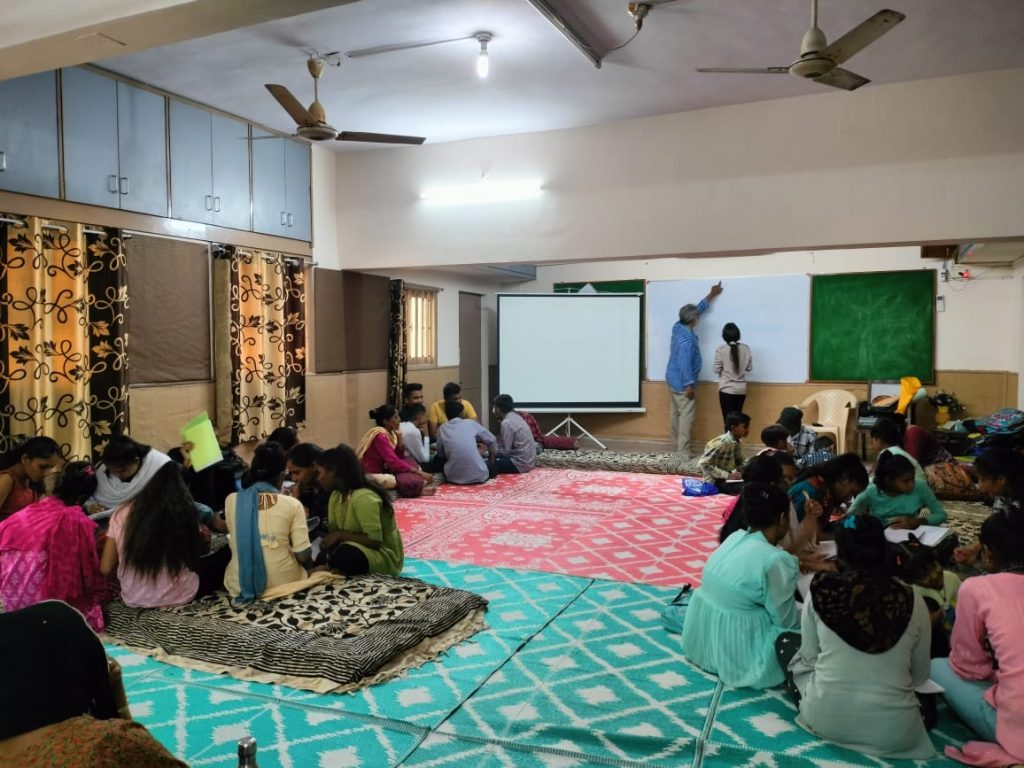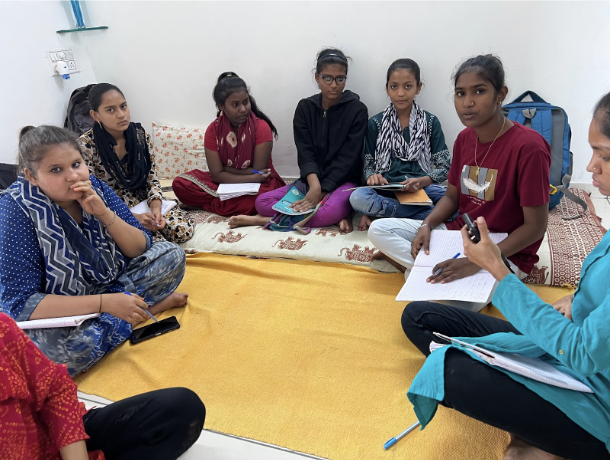In neighborhoods where the weight of tradition and poverty still dictate the lives of many young women, the Girls’ Education Program (GEP) is quietly rewriting stories. Led by Meera, this initiative focuses on young women who face some of society’s steepest barriers: those without fathers, who have dropped out of school, and who belong to marginalized communities like Dalits and Muslims. For these girls, GEP is not just about going back to school—it’s about redefining what’s possible.
A Holistic Approach to Empowerment
While the core of GEP is rooted in education—with a strong emphasis on English and computer literacy—the program goes beyond textbooks. Girls learn practical life skills, build confidence, and prepare for real jobs. Parents are encouraged to postpone their daughters’ marriages until after they’ve completed their education, helping the girls gain independence and capacity.
The living conditions for many participants are difficult. Homes often lack running water, and the neighborhoods, though not slums, flood when it rains. Mothers—many of whom are widows—struggle daily, both economically and socially. Some even face harassment by authorities. Yet, through these hardships, their daughters are beginning to shine.
Khushboo: “Confidence is the most important thing I learned.”
At 22, Khushboo is a glowing example of the transformation GEP fosters. She lost her father at a young age, and her mother—a single mom to three children—never had a formal education. In a community where girls are often expected to marry early and become homemakers, Khushboo’s path was different.
She joined the program nearly eight years ago. Today, she’s a graduate working at a hospital and planning for her master’s degree. Fluent in English as well as Gujarati, she credits the program not only for her education but for giving her the self-confidence to dream bigger. “GEP introduced me to computers and a whole new online world. This triggered an interest in me on software, programming and AI. I just completed a 10 month course “Computer Hardware and Network Administrator”, which I am sure will stand me in good stead in securing a good job”, says Khushbu.
“If I hadn’t joined the Girls’ Education Program, I probably would have been married by now,” she says. “Support is what made the difference.”
Komal: Building Skills, Building a Future
Komal Mangu, also 22, lives in Behrampura and recently completed her graduation in psychology. She’s intends to pursue her master’s degree while working at a call center, where she’s honing communication skills in Gujarati, Hindi, and English—skills she first began learning through GEP.
Komal’s mother was widowed when Komal was just four. The social stigma around being a single mother made life harder, especially in a community where girls were discouraged from even stepping outside. “At first, I was uncomfortable talking to people,” Komal recalls. “But the other girls had similar stories, and that helped.”
She’s determined to work after marriage and envisions a relationship where both partners share decisions equally. She dreams of exploring cultures beyond India and spends her free time painting and drawing.
A Sisterhood of Strength
Khushboo’s younger sister, Komal Madhu, now on the path to a BA in psychology while working at TATA Motors, has also been with the program for six years. Initially a school dropout, she is now preparing to graduate and speaks with growing confidence. “I never used to talk to people. Now I can,” she says. Like her sister, she wants to be independent—and she’s proof that change can be contagious within families.
Poonam: From Failure to Focus
When Poonam failed her 10th grade exams, she thought it was the end of her education. “I figured I’d just get married,” she admits. But her mother—who wakes up at 4 a.m. to sell food in the market—pushed her to keep going. With support from GEP, Poonam returned to school, switched from commerce to arts, and has completed her BA in economics from Gujarat University, with a distinction. She’s even applying for a master’s in data analytics.
“I didn’t want to study at first, but when I saw other girls—especially older ones—studying, I realized I could have a future too.”
Misba: Bridging Gaps and Aiming High
Misba recently completed her 12th grade from the National Institute of Open Schooling and has started working at a call center while waiting for her exam results. She plans to pursue a degree in arts and eventually hopes to become a bank manager. Misba’s journey also reflects the cultural bridge the program has helped build.
“At first, there was some distance between Muslim and Hindu girls,” she explains. “But now we celebrate each other’s festivals together.”
Misba has also learned self-defense through the program, giving her the confidence to move through the world more freely.
Changing the Narrative
With 34 students currently enrolled, the Girls’ Education Program is still small—but its impact is profound. In a place where most girls leave school by 10th grade to prepare for marriage, these young women are choosing education, employment, and empowerment.
The challenges remain steep. Many girls still face pressure to drop out and marry early. But each graduate, each job, and each new dream is a quiet revolution—one that Meera and her team are nurturing, girl by girl.
As Khushboo puts it, “The future? I’ll just go with the flow. But now, I know I have one.”


